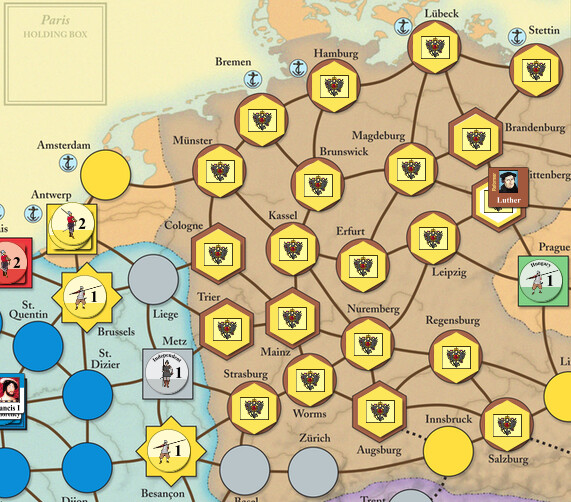Here I Stand Rules Overview, Part I
Here I Stand is a game about the military and religious struggles of the early Protestant Reformation (1517-1555).
The Map
The Holy Roman Empire, 1517
There are four types of land spaces on the map: Key Spaces (Square), Electorates (Hexagon), and Fortress Spaces (Octagon) (collectively, “Fortified Spaces”) and Unfortified Spaces.
Key Spaces award victory points to all players (except the Protestants), and may increase the number of cards they draw at the beginning of the turn.
Electorates award victory points to the Protestant player when they are under Protestant political control and religious influence.
All fortified spaces cannot be captured unless they are besieged and subsequently assaulted.
Spaces of a player’s color are “home spaces.” Spaces that are grey are independent spaces. Solid color spaces are under Catholic religious influence; spaces with a colored border and white center are under Protestant Religious influence.
The oceans are divided into sea zones.
Powers and Rulers
There are six powers in the game: the Ottoman Empire; the Hapsburgs; England; France; the Papacy; and the Protestants. Each power has a starting Ruler, who appears on their power card. The English, French, Papacy, and Protestants each have one or more replacement leaders, which will come into play via event cards.
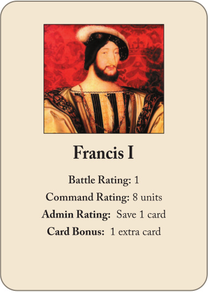
Francis I, King of France
Rulers possess two Ruler attributes: administrative rating and card bonus. The administrative rating of a ruler determines how many cards a ruler can save between one round and the next. The card bonus of a ruler is the number of additional cards that ruler’s power is dealt each turn.
Rulers may also be military leaders or religious reformers/debaters (covered in a future post).
Each power has a power card which has game information, tracks territory VPs and cards drawn per turn, and tracks bonus VPs.
Leaders and Units
Land

Regular unit, Mercenary Unit, Cavalry Unit, and Leader
Land leaders have two ratings: a battle rating and a command rating. The battle rating is the number of additional dice the leader rolls during land battles, and increases the chances for a formation commanded by that leader to avoid battle or intercept an enemy stack. The command rating is the number of units a leader can control at one time.
A formation is a group of land units in a single space the operates as a combined entity for movement, battle, interception, and assault. Without a leader, the maximum formation size is four units. With one leader, the maximum formation size is the leader’s command rating. With two or more leaders, the maximum formation size is the sum of the highest two command ratings.
There are three types of land units: Regulars, Mercenaries, and Cavalry. Each type of unit has a numeric value that represents how many units are present. Regulars have a multi-colored unit symbol and are more expensive to construct than mercenaries. Mercenaries have a solid black unit symbol, and are cheaper to recruit, but can run off or switch sides via some events. Cavalry replace mercenaries for the Ottomans. They cannot participate in sieges/assaults, but provide a bonus to intercept and avoid battle attempts when they are in a stack.
Naval
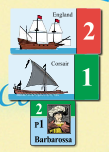
Squadron, Corsair, and Naval Leader
Most Naval leaders have only a battle rating, which is the number of additional dice the leader rolls during naval battles, and increases the chances for a fleet commanded by that leader to avoid battle or intercept an enemy fleet. The Ottoman naval leaders Barbarossa and Dragut have a piracy rating, which increases the number of piracy dice the leader’s fleet rolls when initiating piracy in a sea zone.
Naval Units come in two flavors: Squadrons and Corsairs. All powers have naval squadrons (except the Protestants, who have no boats). Each squadron rolls two dice in combat, and takes two hits to sink. The Ottomans also have Corsairs, which are the only units that can initiate piracy. Corsairs roll one die in combat and take one hit to sink.
Cards
Cards in Here I Stand have a command point (CP) value and an event. With the exception of Mandatory Event cards, every card may be played either for its CPs or as an event. CPs are spent to take actions or to declare war, both of which will be covered in a future post.
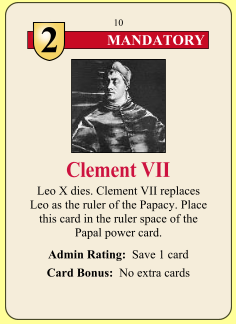
A Mandatory Event
Mandatory Event cards must be played during the action phase of the turn in which they are drawn. When a player plays a mandatory event, the event is resolved, and then the player playing the event receives 2 CPs to spend on actions.
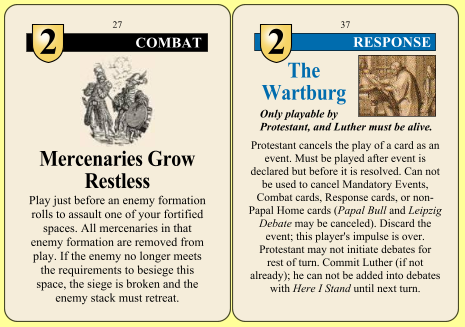
Combat and Response Cards
Response cards may be played to interrupt any player’s impulse (including your own). Combat cards are playable as an event during a battle in which the card owner’s units are participating.
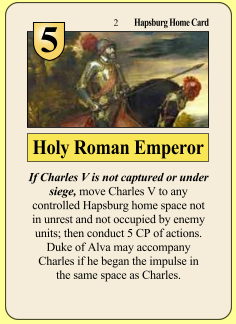
Hapsburg Home Card
Each power has a Home Card (the Papacy gets two) which starts every turn in their hand. A home card may not be held for a future turn, and may not be drawn or discarded from a power’s hand, even if it is the only card in that power’s hand.
Victory Conditions
A game of Here I Stand can end though an automatic victory or, more commonly, through a power amassing a certain number of victory points.
Automatic Victories
Automatic victories can be won either through military conquest (for any power other than the Protestants) or through religious domination (by the Protestant power).
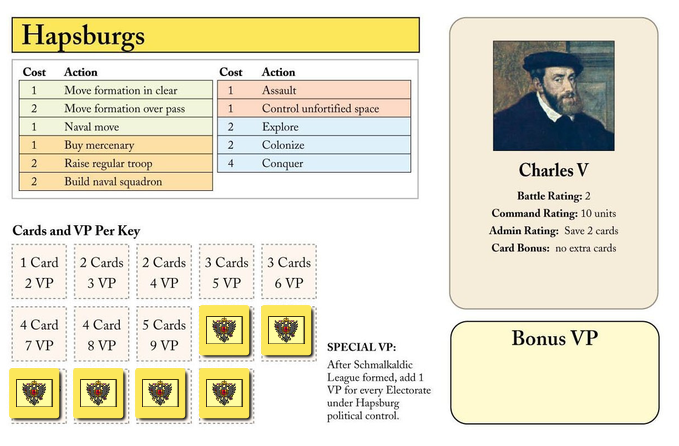
The Hapsburgs need to capture six more key spaces to win a military victory.
A power wins a military victory when it controls enough key spaces on the map (which are square shaped). The number required varies by power, and is found in the information on their power card.
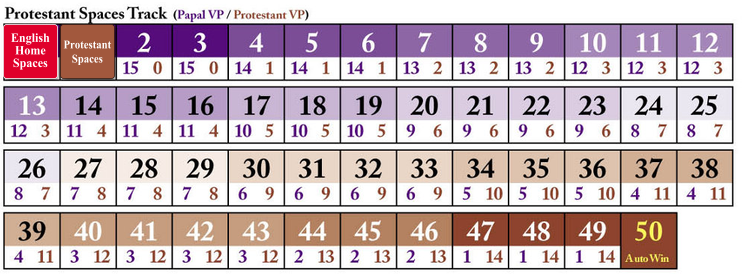
The Protestants only need to convert 49 more spaces to win a religious victory.
The Protestants win a religious victory if the Protestant power achieves religious influence over 50 spaces on the map. In either case, the game ends immediately after the power triggers an automatic victory condition.
Victory Points
A game of Here I Stand is far more likely to end on Victory Points. Base VPs are awarded for territorial control–control of Protestant-influenced electorate spaces for the Protestant player and key spaces for all other players. The various powers can receive special VPs based on their particular rules (e.g. VPs based on the religious struggle for the Papacy, Protestant, and England, VPs for having an heir for England, VPs for piracy for the Ottomans, VPs for building chateaux for France, VPs for winning wars, and VPs for exploration or conquest in the New World).
Victory points are assessed during the Victory Determination Phase. If any power has reached 25 VPs, the power with the highest VP total is declared the winner. Ties are broken based on who had more VPs in the prior turn (moving backwards until the tie is broken).
Starting with the Victory Determination Phase of Turn 4, a player can win a Domination Victory, even if no player has reached 25 VPs. If a player has at least 5 VPs more than each of the other players, that player wins a Domination victory.
If no player has won by the end of Turn 9, the player with the highest VP total wins. Ties are broken based on who had more VPs in the prior turn (moving backwards until the tie is broken).
Next Up: The Sequence of Play and Action Rounds
